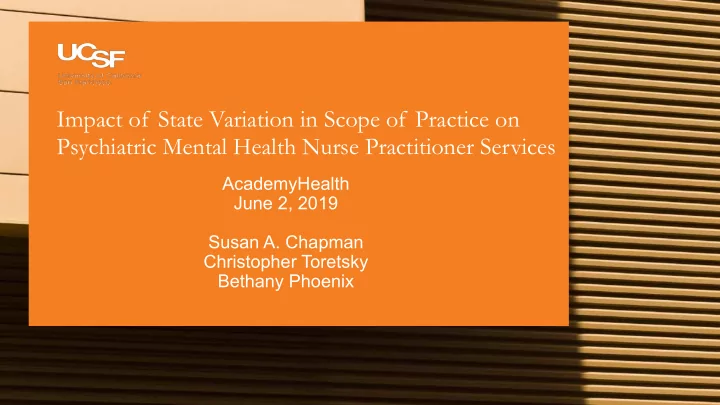

Impact of State Variation in Scope of Practice on Psychiatric Mental Health Nurse Practitioner Services AcademyHealth June 2, 2019 Susan A. Chapman Christopher Toretsky Bethany Phoenix
Disclosures No financial or other conflicts of interest Project funded by the National Council of State Boards of Nursing Center for Regulatory Excellence 2
Background § Shortage of BH providers, esp. prescribers § PMHNPs have skill set to provide needed services § State restrictions on scope of practice may limit optimal use of PMHNPs § PMH-APRN practice associated with positive patient experiences & outcomes of care https://datawarehouse.hrsa.gov/ExportedMaps/H PSAs/HGDWMapGallery_BHPR_HPSAs_MH.p df 3
Study Aims 1. Determine how state scope of practice affects PMHNP practice and education in states with different levels of NP autonomy 2. Identify effects of NP practice restrictions on access to behavioral health services in selected states 3. Follow up to California study 4
Methods § Selected 5 states with varying levels of NP autonomy § Snowball sampling § Site visits- 1 week/state § Data sources • Qualitative interviews • Document reviews § Thematic analysis https://www.aanp.org/legislation-regulation/state- legislation/state-practice-environment 5
Participants: Key informant interviews Prof Org Informants § 94 informants 3% Regulators Psychiatrist 11% • 14-28/state 8% PMHN • Group & individual Agency staff faculty 13% interviews 16% § 40 organizations • 6-10/state PMHCNS 4% PMHNP 45% 6
State Scope of Practice Variation State Level of NP Autonomy Oregon Autonomous since 1995, Insurance parity NPs in PC & BH Colorado Autonomous after 1000 hrs. of supervised practice, Articulated Plan on file Massachusetts Restricted: MD collaborator required for prescriptive practice; Controlled substances prescribing sign off in 96 hours North Carolina Restricted: MD collaborator required. NPs regulated jointly by BON & BOM Illinois Reduced: MD collaborator required. New law will allow FPA after 4000 hrs. supervised practice 7
Impact of Scope of Practice Regulation 8
Summary Findings § Psychiatric assessment & medication management most common role functions § Full practice authority states • More freedom to develop nursing-based models of care • Mixed payor sources • More PMHNPs in leadership § Restricted states • Expense of MD collaborator & difficulty with collaboration arrangements a significant impediment to private practice • Understanding of NP regulations very mixed 9
Opioids and MAT Waivers § Several NPs in all 5 states expressed interest in MAT waiver § Agencies encouraged them to apply • Concern about finding a supervisor • Time for training § New project looking at MAT and state SOP impacts 10
MD Supervision/Collaboration: Positives § “I wouldn’t feel comfortable practicing at this stage of my career without having someone who is more experienced who is required § Collegial support to answer my questions.” § Helpful for new grads § “I would get MD consultation even if it wasn’t required.” 11
Collaboration Negatives Difficulty finding Collaborating MD matching collaborating MD § “ I’m being assigned to a brand-new “If you want to open a private psychiatrist, mostly so I can mentor practice, you may have a hard her. This is not the first time it’s time finding a supervising happened.” psychiatrist. My real dream is § PMHNP with specialty in perinatal to open a practice in X and MH disorders—none of her MD work 2-3 days a week, but supervisors knew as much about it as she did would be impossible to find a supervisor.” 12
MD Supervision/Collaboration: Costs § Costs to agency/practice § Supervision payment to physicians § Out of pocket payments for those in private and group practice • $3000 per month or more • Economic opportunity – passive income § Increased administrative time 13
Supervision often doesn’t occur as required No supervision actually provided "The relationship with the supervisor I had before my current one was bogus. I could barely track her down. Besides, I didn’t have anything to talk to her about because I've been in practice for so long." 14
Beyond State Regulation § Confusion about regulations § Agency policies sometimes more restrictive than required by law § Inefficient: wastes MD & PMHNP time “Per [health system] bylaws, all NP notes have to be co-signed. The physicians hate it—they can’t keep up with reading all the notes.” 15
If the goal is consultation to provide quality practice…. § What we learned • Supervision ¹ Consultation • Supervision did NOT always occur with required frequency • Supervisor maybe not in similar clinical practice area • Often no choice in who was supervisor or supervisee § Consultation worked best when • Matched in practice and location • Just in time consultation • Choice of collaborator • True peer collaboration, sharing knowledge and practice challenges 16
Conclusions § APRN scope of practice legislation based on stakeholder interests, not evidence § Lack of standardization leads to confusion § Requirements for MD supervision • Add to cost of care without improving quality • Reduce access to care • Justify unequal reimbursement 17
References 1. Health Resources & Services Administration. Health professional shortage areas—mental health map. Retrieved from https://datawarehouse.hrsa.gov/ExportedMaps/HPSAs/HGDWMapGallery_ BHPR_HPSAs_MH.pdf 2. Illinois Health & Hospital Association. (2017, June). HB 313 - Nurse Practice Act (225 ILCS 65/), Public Act 100-0513, Summary. Retrieved from www.team-iha.org/files/non-gated/quality/hb313.aspx on August 6, 2018. 3. Rudner, N. & Kung, Y.M. (2017). An assessment of physician supervision of nurse practitioners. Journal of Nursing Regulation, 7 (4), 22-29. 4. Chapman, SA, Toretsky, C. & Phoenix, B. (2019) Enhancing Psychiatric Mental Health Nurse Practitioner Practice: Impact of State Scope of Practice Regulations. Journal of Nursing Regulation , 10(1), 1-9. 18
Recommend
More recommend